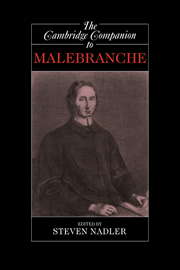Book contents
- Frontmatter
- Introduction
- 1 Malebranche and Method
- 2 Malebranche on the Soul
- 3 Malebranche on Ideas and the Vision in God
- 4 The Malebranche-Arnauld Debate
- 5 Malebranche on Causation
- 6 Metaphysics and Philosophy
- 7 Malebranche's Theodicy
- 8 Malebranche on Human Freedom
- 9 Malebranche's Moral Philosophy
- 10 The Critical Reception of Malebranche, from His Own Time to the End of the Eighteenth Century
- 11 Malebranche's Life and Legacy
- Bibliography
- Index
3 - Malebranche on Ideas and the Vision in God
Published online by Cambridge University Press: 28 May 2006
- Frontmatter
- Introduction
- 1 Malebranche and Method
- 2 Malebranche on the Soul
- 3 Malebranche on Ideas and the Vision in God
- 4 The Malebranche-Arnauld Debate
- 5 Malebranche on Causation
- 6 Metaphysics and Philosophy
- 7 Malebranche's Theodicy
- 8 Malebranche on Human Freedom
- 9 Malebranche's Moral Philosophy
- 10 The Critical Reception of Malebranche, from His Own Time to the End of the Eighteenth Century
- 11 Malebranche's Life and Legacy
- Bibliography
- Index
Summary
One of the most controversial of the claims in Malebranche's first published work, The Search After Truth, is that “we see all things in God” (nous voyons toutes choses en Dieu) (III.2.vi, OC 1:437; LO 230). It is true that this text restricts that particular claim by noting that “we see in God only the things of which we have ideas” and in particular, only bodies and their properties. Yet even given this restriction the doctrine that we see all things (that is, bodies) in (that is, through ideas in) God scandalized Malebranche's most prominent critic, the Augustinian theologian and Cartesian partisan Antoine Arnauld (1612-94). Arnauld protested in particular that such a doctrine has the “bizarre” consequence that “we see God when we see bodies, the sun, a horse or a tree.”
Arnauld was objecting here not only to the placement of ideas of material objects in God, but also, and more basically, to the reification of ideas. As an alternative to Malebranche's claim that the ideas we perceive are “representative beings” distinct from our perceptions, he offered the position, which he plausibly ascribed to Descartes, that such ideas are identical to those perceptions. It is difficult not to prefer Arnauld's parsimonious account of ideas to Malebranche's more exotic doctrine of the “Vision in God” (as I call his thesis that we see bodies by means of ideas in God). Yet Malebranche did not simply overlook Arnauld's alternative to his doctrine. Indeed, he came to insist that such an alternative cannot explain how our perception of the nature of bodies can reach beyond our finite experience.
- Type
- Chapter
- Information
- The Cambridge Companion to Malebranche , pp. 59 - 86Publisher: Cambridge University PressPrint publication year: 2000
- 15
- Cited by

